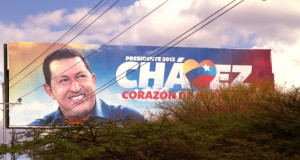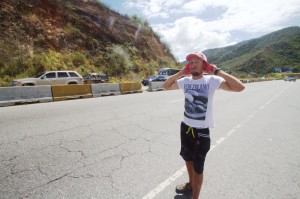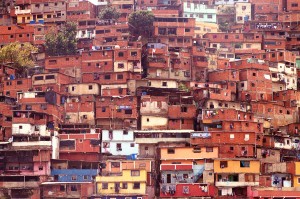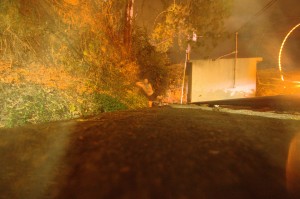Venezuela – fuel for free, the dollar maze, gold mines and (un)safety in the country
The fountains of fuel, potholes on the roads and antique automobiles
Near the border stops an old ford-ship. Perhaps a forty year old vehicle we can call it old. Not patched, like hundreds of neighbouring cars. There is a feeling, that someone has brought all the antique cars from some USA old fashioned dump here. But the reality is opposite. There was a time when Venezuelans had good life. Everyone remembers it with nostalgia, when people were able to buy good cars and live a decent life. Those who worked, lived. Now, nobody can live, neither those who work nor who don’t. The corruption is the same as before, but now it cannot be covered. Bolivar (Venezuelan money) is worthless.
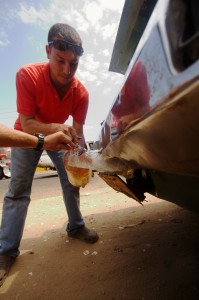
Pritrūkus benzino, teko jo medžioti iš motociklininkų. | When we ran out of the gas it was necessary to buy it form the motorcyclists around.
So the driver picks us up to his old school car. This time he wouldn’t dare to ask to cover his fuel costs as for instance somewhere in Uzbekistan. Well, mainly because the fuel here is a present from government to people. Ok, not entirely free, but the price is ridiculous. The fuel calculated here not in liters or gallons, but in tanks. So for a tank (let’s say 80litre) you will pay 8 bolivars, or 2dollars – if calculated officially. But in reality, it would cost you half a dollar. For a tank. Half a dollar. So no wonder why everyone even having a skeleton with some metal sheets covered, is able to drive.
You can only guess, what a temptation to share such a gift with a neighbour. Not for free of course. The roads in Colombia are covered with all sorts of tanks and bottles with fuel from Venezuela. It’s cheaper than the local. You would think that the government should stop the flow. In theory there are some measures taken. The roads, particularly closer to Colombian border, are densely populated with police, army checkpoints. You would think that the sieve should prevent the fuel flow to neighbours. Not at all, even the trucks manage to pass without being noticed. Of course. not for free.
So the government tries another way. In the petrol stations close to Colombian border only the locals (meaning from that district) can fill their tanks. Your car will be ‘chipped’ and that’s how you will be recognized and granted with the necessary (80 litres per day) fuel. Our driver was not from the region. So when he ran out of fuel, he had to stop and beg others for a litre to spare. Surely, not for that ridiculous price.
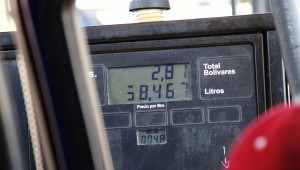
Benzinas čia beprotiškai pigus. Už tuos 58 litrus jis sumokės maždaug keturiasdešimt lietuviškų centų. | The gas is increadibly cheap here, even cheaper than in Turkmenistan. for those 58l of gas he will pay just half a dollar.
But if you give away your fuel cheaper than the salt, would you not calculate your resources, and fix those potholed roads. The same system in oil giant Turkmenistan, where the cars – old they or new – have to ride over those roads and sweat and curse. Who can explain the logic here? Not the locals. Well, we can go and pass it, but the locals have to live with that.
The safety in Venezuela
Police and army checkpoints will be follow us all the way till Brasil. That Colombia is not a safe place to travel we have heard lots. But we didn’t expect Venezuela to be apparently worse. The kidnapping is a usual everyday reality for diplomats, businesspeople, tourists. Caracas looses a hundred inhabitants each week.

Policijos ir armijos gausu - kas keliasdešimt kilometrų, o ties Kolumbijos siena ir tankiau. | On a two hundred kilometer road from the boarder there are round twenty police posts stoping cars and looking for illigal stuff.
Whilst going with one driver we looked at the mountains with amazement how beautiful they were, when the guy said that he was kidnapped for three days, tortured and his family was asked for a ransom. He got out alive, but his friend’s destiny wasn’t as bright. He lost his life not being able to get money on time.
A lot of drivers were complaining, that now none wants to work, and such robinhoods who try to equal the inequality are indeed lazy to work but want to get money as fast as they can. There is even a profession – a bargainer with kidnappers. ‘Thanks Hugo Chavez for that’ the driver talks. He is Portuguese, living here for long time and remembering with nostalgia good times.

Kai kurios mašinos atrodo subyrės vien nuo prisilietimo. Kuras pigus, todėl net ir neturtingesni gali važinėtis. | Some cars look like going to break at any moment, but as the gas is cheap even the poor can have a drive.
And only one driver with sympathy talked about Hugo as he helps poor too. He showed Petare, the biggest shantytown in Caracas. A real beehive with tons of coloured houses, but living so densely that privacy is not a question here. Exotic to see, but when you have to live in the conditions as such. But Chavez built them a metro. And he provides houses to some. And he is generous to those who are loyal to him. But why there are still lots commoners who adore him wearing red t-shirts and baseball caps, its not sure.
The corruption is high in every country, if you speak across the world. But here is obvious. Despite the fact the police and army are checking your luggage and cars for possible drugs or any illegal load, they are willing to accept the fee to let you through. Like one driver has filled six tanks to be ready for his journey to Brasil and sell it over there. ‘Do you know how much will I earn?’ he was open. He was giving them small gifts, and they were greeting and smiling at him like he would be his old good friend. Even for us, when a police wanted to check our bags, we willingly gave them, then all of a sudden they changed their mind. The driver explains – why bother. They see that your free offer to check your luggage means you have nothing illegal here, so no ‘fee’ will be necessary.
The dollar trap
When we just arrived to Venezuela, we almost got a shock. When we checked on the internet the official exchange rate bolivar to dollar, it meant 4 bolivars to one dollar. If we calculated prices accordingly, the milk would cost us 10 dollars, a bag of crisps 20$. How to live with a budget of 5$ per day? But then we realized, that its only if we calculate in official way. In reality, meaning, black market, the dollar costs 18 bolivars, and NOBODY (luckily, neither us) exchanges dollar officially. So all of a sudden the live became possible here too. But that is because the government tries to control the dollar rate, and it doesn’t work. There are no dollars left in the country officially, and the bolivar is close to nothing.
Venezuela is just a country of contrasts. Very rich in resources, but with no logical way to manage them, it’s a ridiculous economy example so far. People are miserably unhappy, still with the recent memories of bonanza, when the president was different, and things were far better. Apparently, Chavez likes to evict foreigner companies from the country too, so to invest here is a huge risk. In the past, when the strikes were apparent, instead of solving the problem, he dismissed the fuel refineries, so the specialist went to other countries. Country with lots of oil, was left without refineries. So huge debts despite the fact how resourceful this country is.
The travel through the country
Maracaibo bridge seemed longer than the longest bridge we’ve been. You are going, and the other bank seems like a good distance away. It got dark, and as soon as we got out on the other side of the bridge, we asked an old lady whether we can pitch a tent in her garden just right on the bank of Maracaibo lake. Now, tired from the city chaos and unimaginable heat, we were sitting and looking at the caravan of the lights, and enjoying the peace.
But to hitch the next day was a challenge. It was hot, dusty and nobody was willing to stop. Maybe the carnival was responsible for full cars, or maybe – as one local said – the attitude of Venezuelans, who are not ready to help each other. Nor to foreigners.
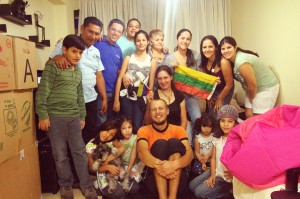
Mus priėmusi venesueliečių šeima nepaliovė stebėtis mūsų kelione, kuri mums - tai jau gyvenimas. | One nice family accepted us for a nights stay.
And then hitching near Caracas was sort of a real nightmare in the eyes of others. ‘Its CARACAS’ police huge eyes and a surprise in the voices. It’s very dangerous here. Surely it is, but we have to pass it somehow. So thanks to good people, like Carlos and his family, we not only passed the scary bit, but also had a cozy night with their family talking about our travels. Carlos wife couldn’t believe we are on a journey like this. ‘Not a week I’d be able to do like this’ she sighed.
Ok, some countries are easier to hitch. We still have fond memories of Asia, Alaska, Canada or Central America, where you don’t have to think of whether you will hitch anyone, it’s only matter of minutes. But here, in South America we learned another thing. Good people exist everywhere, only here we have to wait for them a bit longer. But the patience is greatly rewarded.
The confession of a gay person
Edgar at first looked sceptically at our ‘kola’ (hitching idea). He thought we will contribute to the journey. But after hearing of our journey, he was excited. And started to pour his heart out about the hard homosexual life in Venezuela. He has a partner for twelve years, but unfortunately this partner has got a family as a cover for his different sexual needs. ‘I know at least eight of my friends who are in the position as this. They lead a bisexual life only to pretend that they are normal in the society’s perspective, but generally they cheat on their wives to be what they are. ‘In Europe it’s different I suppose’ we could hear the jealousy in his voice.
So after this conversation he perhaps felt much lighter at his sorrow and even bought us some bread with cane sugar – a local delicacy. That’s the hitching life. At first, you have to somehow convince on the road a driver to change his mind and instead of him going alone for a good number of hours, he would choose a company of strangers. Or even squeeze his family, to locate those foreigners. But then we have to calculate whether it’s pretty safe too. And then the discussion in the car often completely changes the attitude of the driver.
To Brazil with the vehicles carrying illegal loads of fuel
Chuan, with a baseball cap and tracksuit, felt like a trusted person. At first, he only took for some kilometers, but after hearing our plans, he said he is going to Brazil tomorrow. So we could stay in his ranchito until we leave. Until then he had to load immense quantities of fuel – a way to earn those extra dollars.
The little farm was looked after an old local lady with his son. At first his son in all possible ways tried to cheer us up, despite the fact we were happy just stretch out in the hammock and enjoy the rest and peace. After all, he made us interested too. ‘There are lots of gold mines here. The gold is everywhere. But I’m not going to work in those mines, as the dengue virus is very dangerous. Besides, bad people kill each other here. But I can show you how does it look like’. He brought a tiny pebble with some gold dust and tiny pieces in it. The stones then normally are crushed, milled and the dust in reaction with aluminum separate, and the pure gold extracted. Incredible, how many lives were given away for pebbles like that.

Apsistojame pas Chuaną, kol jis suveš benziną į vieną vietą misijai į Braziliją. | We have stayed at Chuan, who was taking the cheap Venezuela's gas to sell it later to the black Brazilia's market.
Eldorado – the gold city, or maybe a little town, despite having a royal name, its suburbs with houses built from metal plates didn’t look royal at all.
So we are leaving Venezuela. That continuous warning that is unsafe here got us too, we frequently chose safer (meaning closer to army posts) places to sleep and to hitch. Well, locals do the same. So it seems we got into a belief, the same as everyone, that only army can prevent us from the evil. But the army was corrupted too. And if we didn’t look so shabby and not rich, who knows, if not the same army could have got in touch with those kidnappers. You see where we are going? We are getting paranoid, and truly unsure what is safe in this country. We are only happy to have met the nicest collection of people, and be hosted by those too.

Ūkį prižiūrėjusi moteriškė svetingai mus priėmė. | The lady that was looking after the farm took us welcoming.
Now we are enroute to Brazil. We sigh, as we think it will be safer. The huge country is awaiting, and no more Spanish spoken, meaning we will have to start learning Portuguese. Lost of questions, let’s see what is awaiting there.

